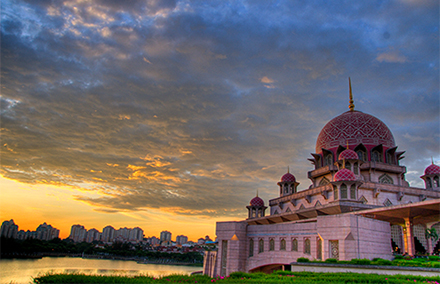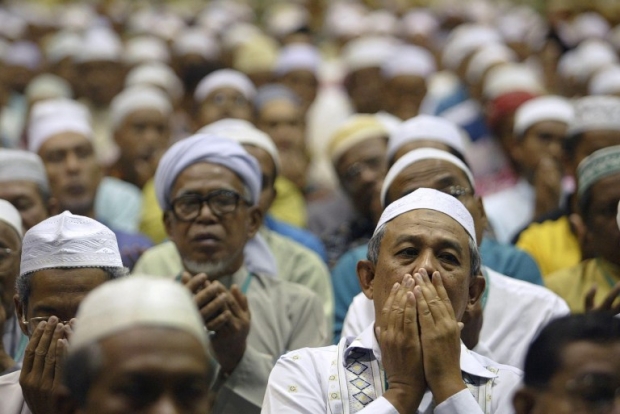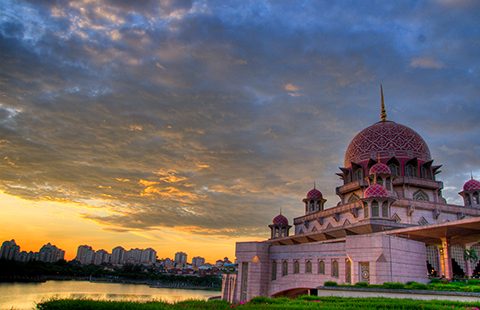
Power plays for notions of “Malayness”, and not Islam, continue to shape the nation’s politics, argues Manjit Bhatia.
I become very cynical whenever the awfully clichéd word “discourse” is thrown up as if it is the only term that can effectively describe political, economic or any other social science narrative. And so it turns out for Ooi Kok-Hin in his essay, The rise and rise of Muslim politics (in Malaysia), to which he lends repute to Bayesian probability.
Ooi begins with a bold claim — the politicisation of Islam in Malaysia has gained “momentum and influence” over the last 30 years. He also asserts that “society and the state” are becoming “increasingly Islamised” and to that extent “there is likely to be an increase in political Islam.”
If I were to add a third teaspoon of sugar to the one already in my Nescafe Blend 43 (usually black), my coffee definitely would be sweeter. I can measure that. But how does one measure an “increase in political Islam”?
At any rate, the sugar becomes the centre of how my coffee tastes, as much as would Ooi’s “Muslim-centered politics will play an increasingly important part in Malaysian politics, and the discourse in the public sphere will adopt the language of political Islam.”
Thus, Ooi claims, Malaysia’s future rests upon the “type of Islam practiced in society,” which is, he argues, “most likely to be the dominant, state-sanctioned political Islam that emerged victorious in its battle for supremacy over other types of political Islam”. When was it not state-sanctioned? Also, one’s unsure what Ooi means by “society”. It would be sacrilegious of him to suggest that Chinese, Indians (Sikhs included) and Christians in Malaysia practice Islam. It would be factually incorrect, too.
As if Ooi has not already created a few problems in his opening two paragraphs, he starts to open a third can of worms. After alluding to rival forms of Islamism, he fails to mention which are competing for Malaysia’s political centre. An easy guess: Sunni versus Shi’ite.
But then, curiously, in the rest of his essay, Ooi seems disinterested in critically extending on his thesis of competing political Islamism. He redacts what he promised to discuss; instead, he revisits Malaysia’s undying obsession with its characteristic politico-ideological trait – race/racism wrought, of course, by religion; Islam, in this case. Three-quarters through, Ooi offers the clincher: “Overall,” he says, “religion is superseding race and royalty.”
I don’t know how he arrives at this summation.
Notwithstanding his disjointed essay, and quite apart from his crude positivism, Ooi’s many problems cannot be covered in a short space. Nevertheless, I tender two counter-arguments. One, Ooi’s assertions are undermined because he presents an erroneous reading of his own country’s politics, historical and contemporary. Second, while UMNO has been sidling up to greater Islamisation, it’s only in name and for desperately opportunistic politico-ideological reasons (apropos Ooi’s claim that “the lack of substantive ideological debate is telling”).
Religion — as if only one is practiced in Malaysia — is not superseding race and royalty. It never will. Nor will Islam, whatever its variant. To be fair, Ooi is correct that the UMNO-dominated one-party Malay state has taken a great deal of shine to Wahabist Islamism. But the supplanting of race and royalty by religion is not being manifested for the positivist (survey-based) reason Ooi posits: that today Malay identity with Islam displaces Malay racial identity.
It would be wrong to construe this exchange as a turn towards Islamic fundamentalism or Islamic conservatism, for two reasons.
One, UMNO and its Wahhabist Islamism have actively and unapologetically denigrated Shi’ite Islam and persecuted its followers. This can be better understood in the context of the growing role of Saudi Arabia and its financing of Wahhabism as a bulwark against the spreading influence of Shi’ite Iran, theologically and geo-strategically. Neither afoot here is a perverse form of Huntingtonian clash of civilisations nor a (prophet) Muhammadian theological utopianism. This leads to the second point.
In no essential or substantive way is this vilification different to Malay-Muslim UMNO maligning Christianity and Christians and openly lauding its vile bigotry towards Judaism and Jews at every political opportunistic moment. And here’s one contradiction that flies in the face of Saudi influence-peddling — Riyadh’s “affinity” to Tel Aviv just as Iran steps up to carve out a greater sphere of influence from the Middle East and northern Africa to Southeast Asia.
When are the moments in Malaysia that the UMNO state is seen to peddle Wahhabist Islamism (these days in association with once arch enemy Parti Islam Se-Malaysia (PAS)? These moments often relate to a crisis within the UMNO political movement, a party that is far from unified but riven by warring factions among its feudal-capitalist class. And when the moment is related not to the specificity of Islam’s place in Malaysia’s politics, which via its bastardised constitution, is incontestable, but driven principally by Malay support for UMNO, especially when it may seem to be rescinding.
And so residing at the centre of this schism is the increasingly warped, and thus desperate and dangerous, sense of Malay nationalism. Ooi would have done better if he had also stuck to an analysis of the notion of Bangsa Malaysia, the literal translation of which is the ‘Malaysian race’ or the ‘Malaysian community’. In other words, citizenship, but in an agency sense, not a literal one. But both Malay nationalism and Bangsa Malaysia are notions fraught with intractable problems — problems the UMNO state wants to keep as intractable as possible for as long as possible to ensure regime survival.
In fact, the notion of Bangsa Malaysia is anathema to the continued existence of the UMNO Malay one-party state in its present form. Maintaining the subservience, or ‘loyalty’, of the Malay population, most of whom are constitutionally given as Muslims anyway, is far more critical to the ruling UMNO Malay political elite and their dominant capitalist class for the reproduction of ersatz capitalist relations and real capitalist accumulation via manipulation by the state.

It is unfortunate that Ooi does not see that this politico-capitalist order has not changed since at least 1957. And if anything, it has intensified over the last four-plus decades. It has intensified because more and more urban, educated Malays, brought up also on a pluralist fodder of technological sophistication, are no longer aping the sycophancy of their elders by backing only and always UMNO. Today they have alternatives, such as the Malay-based, seemingly progressive, opposition parties in Parti Keadilan Rakyat (PKR) and Amanah (and PAS to a diminishing extent).
Even the Chinese-dominated Democratic Action Party (DAP) offers Malays political alternatives in airing their grievances against the UMNO Malay one-party state that has singularly failed in creating upwardly mobile job opportunities and job security while lessening their living standards. Ooi claims “race and racial politics are in decline but are given a lifeline when injected with religion.” This used to be the case, but it’s not a viable one today. The lure of materialism and capitalism for Malays is irresistible, especially when they see the Malay political elite and the capitalist classes living the high life of vulgar materialism (not to be seen in a coarsely erroneous Marxian interpretation).
The urban, educated Malays do subscribe to an Islam but whose variant is the gentler, kinder, non-violent, non hate-mongering toward non-Malays/non-Muslims kind — the sort Irshad Manji notes as more ‘liberal’-informed in its outlook. Conversely, the most likely candidates to be ideologically indoctrinated by Wahabist political Islam are those who are schooled in madrassas, where the sermons are anything but the liberal (reformist) Islam variety. These are the Malays, the Muslims, who are more likely to back and join terrorist organisations like ISIS, and, interestingly, the UMNO state is ‘repudiating’ them. Somehow Ooi missed all these nuances.
And if the urban, educated Malays are affected by the putridity of Najib’s voodoo economics, they do not, on evidence, automatically seek refuge in Islam. Rather, they point fingers at the UMNO regime for failing them despite their inheritance of their Malay “special rights”, not Muslim or Islamic special rights. They do not, as opposed to Ooi, engage in the so-called discourse or language of political Islam. Indeed, they are more likely than not to engage in opposition or protest rallies in seeking equality and justice.
These young Malay graduates may seem slow in uptake, but it does not mean they’re taking up the cudgels of Wahhabist Islamism. And just because Malaysia’s monarchs have been silenced by constitutional orders ordained by the former premier-dictator Mahathir Mohamad, it does not mean that religion has superseded their position in Malay life, any more than religion has transplanted the Malay race. How can it when race and religion remain, as yesteryear, strongly synonymous with “Malayness” today?
Ooi mistakes the rise of Muslim politics for the power-play around Malayness or the “Malay way,” as Diane Mauzy aptly coined it 30 years ago. All of this is still to play for, and even harder to play for, by the increasingly desperate, crisis-prone and deeply scandalous UMNO-Malay one-party state primarily for its material survival. The sooner we understand this, the less likely we are to exaggerate claims that Malaysian politics is being subsumed by Muslim politics.
By any stretch of the imagination, in 2016 it’s still the old order in Malaysia — only that some of the ground rules are fast changing, though not necessarily in UMNO’s favor, it would appear.
Manjit Bhatia is an Australian academic, journalist, writer, and research director of AsiaRisk, an economic and political risk analysis consultancy. He specialises in international economics and politics, with a focus on Asia.
 Facebook
Facebook  Twitter
Twitter  Soundcloud
Soundcloud  Youtube
Youtube  Rss
Rss 